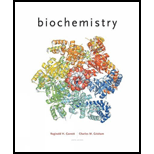
Biochemistry
6th Edition
ISBN: 9781305577206
Author: Reginald H. Garrett, Charles M. Grisham
Publisher: Cengage Learning
expand_more
expand_more
format_list_bulleted
Concept explainers
Textbook Question
Chapter 24, Problem 12P
Understanding the Mechanism of the 3-ketosphinganine Synthase Reaction Write a reasonable mechanism for the 3-ketosphinganine synthase reaction, remembering that it is a pyridoxal phosphate-dependent reaction.
Expert Solution & Answer
Trending nowThis is a popular solution!

Students have asked these similar questions
Please draw out the following metabolic pathways: (Metabolic Map)
Mitochondrion: TCA Cycle & GNG, Electron Transport, ATP Synthase, Lipolysis, Shuttle Systems
Cytoplasm: Glycolysis & GNG, PPP (Pentose Phosphate Pathway), Glycogen, Lipogenesis, Transporters and Amino Acids
Control: Cori/ Glc-Ala cycles, Insulin/Glucagon Reg, Local/Long Distance Regulation, Pools Used Correctly
Please help provide me an insight of what to draw for the following metabolic pathways: (Metabolic Map)
Mitochondrion: TCA Cycle & GNG, Electron Transport, ATP Synthase, Lipolysis, Shuttle Systems
Cytoplasm: Glycolysis & GNG, PPP (Pentose Phosphate Pathway), Glycogen, Lipogenesis, Transporters and Amino Acids
Control: Cori/ Glc-Ala cycles, Insulin/Glucagon Reg, Local/Long Distance Regulation, Pools Used Correctly
write ionization equilibrium
Chapter 24 Solutions
Biochemistry
Ch. 24 - Explaining the Stoichiometry of Fatty Acid...Ch. 24 - Tracing Carbon Atom Incorporation in Fatty Acids...Ch. 24 - Modeling the Regulation of AcetyI-CoA Carboxylase...Ch. 24 - Prob. 4PCh. 24 - Prob. 5PCh. 24 - Prob. 6PCh. 24 - Understanding the Stoichiometry of Cholesterol...Ch. 24 - Prob. 8PCh. 24 - Prob. 9PCh. 24 - Prob. 10P
Ch. 24 - Prob. 11PCh. 24 - Understanding the Mechanism of the...Ch. 24 - Prob. 13PCh. 24 - Understanding the Mechanism of the HMC-CoA...Ch. 24 - Prob. 15PCh. 24 - Prob. 16PCh. 24 - Prob. 17PCh. 24 - Prob. 18PCh. 24 - Prob. 19PCh. 24 - Prob. 20PCh. 24 - Prob. 21PCh. 24 - Prob. 22PCh. 24 - Prob. 23PCh. 24 - Prob. 24PCh. 24 - Prob. 25P
Knowledge Booster
Learn more about
Need a deep-dive on the concept behind this application? Look no further. Learn more about this topic, biochemistry and related others by exploring similar questions and additional content below.Similar questions
- write the ionization equilibrium for cysteine and calculate the piarrow_forwardplease answerarrow_forwardf. The genetic code is given below, along with a short strand of template DNA. Write the protein segment that would form from this DNA. 5'-A-T-G-G-C-T-A-G-G-T-A-A-C-C-T-G-C-A-T-T-A-G-3' Table 4.5 The genetic code First Position Second Position (5' end) U C A G Third Position (3' end) Phe Ser Tyr Cys U Phe Ser Tyr Cys Leu Ser Stop Stop Leu Ser Stop Trp UCAG Leu Pro His Arg His Arg C Leu Pro Gln Arg Pro Leu Gin Arg Pro Leu Ser Asn Thr lle Ser Asn Thr lle Arg A Thr Lys UCAG UCAC G lle Arg Thr Lys Met Gly Asp Ala Val Gly Asp Ala Val Gly G Glu Ala UCAC Val Gly Glu Ala Val Note: This table identifies the amino acid encoded by each triplet. For example, the codon 5'-AUG-3' on mRNA specifies methionine, whereas CAU specifies histidine. UAA, UAG, and UGA are termination signals. AUG is part of the initiation signal, in addition to coding for internal methionine residues. Table 4.5 Biochemistry, Seventh Edition 2012 W. H. Freeman and Company B eviation: does it play abbreviation:arrow_forward
- Answer all of the questions please draw structures for major productarrow_forwardfor glycolysis and the citric acid cycle below, show where ATP, NADH and FADH are used or formed. Show on the diagram the points where at least three other metabolic pathways intersect with these two.arrow_forwardanswer the questions please all of them should be answeredarrow_forward
- Burk plot is shown below. Calculate Km and max for this enzyme. show workarrow_forwardInsert Format Tools Extensions Help Normal text ▾ Arial C 2 10 3 + BIUA Student Guide (continued) Record data and conclusions about the mystery food sample either below or in a lab notebook. Step 2: Protein Test (Biuret Solution) Gelatin Water [Mystery Food (Positive Control) (Negative Control) Sample pink purple no change no change They mystery food sample does not contain protein because the color of the test tube wasn't pink or purple Color Conclusion They mystery food sample does not contain protein because the color of the test tube wasn't pink or purple Step 3: Lipid Test (Sudan Red Solution) Vegetable Oil Water (Positive Control) (Negative Control) Mystery Food Sample floating red no change floating red the mystery food dosnt contain lipids because the test tube has floating red 75 % 87 8 9 7 ChromeOS C Device will pow 26.battery lea powerarrow_forwardThe rate data from an enzyme catalyzed reaction with and without an inhibitor present is found in the image. Question: what is the KM and Vm and the nature of inhibitionarrow_forward
- 1. Estimate the concentration of an enzyme within a living cell. Assume that: (a): fresh tissue is 80% water and all of it is intracellular (b): the total soluble protein represents 15% of the weight (c): all the soluble proteins are enzymes (d): the average molecular weight of the proteins is 150,000 (E): about 100 different enzymes are present please help I am lostarrow_forwardPlease helparrow_forwardThe following data were recorded for the enzyme catalyzed conversion of S -> P. Question: Estimate the Vmax and Km. What would be the rate at 2.5 and 5.0 x 10-5 M [S] ?arrow_forward
arrow_back_ios
SEE MORE QUESTIONS
arrow_forward_ios
Recommended textbooks for you
 BiochemistryBiochemistryISBN:9781305577206Author:Reginald H. Garrett, Charles M. GrishamPublisher:Cengage Learning
BiochemistryBiochemistryISBN:9781305577206Author:Reginald H. Garrett, Charles M. GrishamPublisher:Cengage Learning BiochemistryBiochemistryISBN:9781305961135Author:Mary K. Campbell, Shawn O. Farrell, Owen M. McDougalPublisher:Cengage Learning
BiochemistryBiochemistryISBN:9781305961135Author:Mary K. Campbell, Shawn O. Farrell, Owen M. McDougalPublisher:Cengage Learning Biology 2eBiologyISBN:9781947172517Author:Matthew Douglas, Jung Choi, Mary Ann ClarkPublisher:OpenStax
Biology 2eBiologyISBN:9781947172517Author:Matthew Douglas, Jung Choi, Mary Ann ClarkPublisher:OpenStax

Biochemistry
Biochemistry
ISBN:9781305577206
Author:Reginald H. Garrett, Charles M. Grisham
Publisher:Cengage Learning

Biochemistry
Biochemistry
ISBN:9781305961135
Author:Mary K. Campbell, Shawn O. Farrell, Owen M. McDougal
Publisher:Cengage Learning

Biology 2e
Biology
ISBN:9781947172517
Author:Matthew Douglas, Jung Choi, Mary Ann Clark
Publisher:OpenStax
Anaerobic Respiration; Author: Bozeman Science;https://www.youtube.com/watch?v=cDC29iBxb3w;License: Standard YouTube License, CC-BY